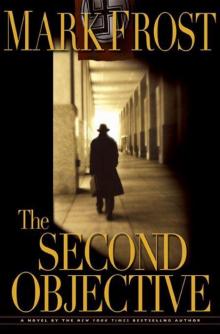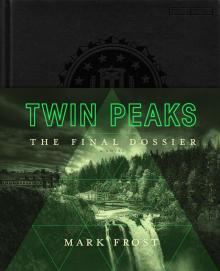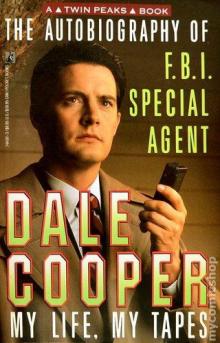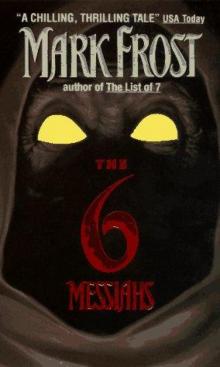- Home
- Mark Frost
The List of Seven Page 2
The List of Seven Read online
Page 2
She was in black, as tall as the young man, willowy and supple, swaying in emotional currents that seemed considerable. Bonnet and shawl framed a pale oval face; a familial resemblance to the younger man—his sister, Doyle chanced, two or three years his senior—but the glimpse of her features was brief as the young man took her arm and ushered her quickly to the door. He knocked straightforwardly, the signal apparently unknown to them. As they waited, the young man attempted to press her on some persistent point—perhaps imprecations against their rough surroundings; it appeared he had accompanied her under protest—but despite her apparent frailty, a steadiness in the set of her eyes indicated her will was the stronger.
The woman glanced anxiously about the street. This is the author of the note, and she is looking for me, Doyle realized. He was on the verge of starting across to them when the door opened, and the house swallowed them up.
Shadows played against the parlor curtains. Employing the glass, Doyle saw the woman greeted by the man whose dark face he had spied earlier at the window, accompanied by the pregnant woman; she took the brother’s hat, the woman’s shawl. The dark man gestured modestly, indicating they should adjourn to an inner room, and with the woman leading the way, they moved from sight.
She is not acting out of bereavement, concluded Doyle. Grief collapses inwardly. What’s propelling this woman forward is fear. And if 13 Cheshire was a snare, she had walked eagerly into its jaws.
Pocketing the glass and reassuringly fingering his revolver, Doyle abandoned his post and crossed the street toward the coachman, who was leaning diffidently against his cab, lighting a pipe.
“Pardon me, friend,” said Doyle, putting on an affable, half-pixilated smile. “This wouldn’t be where they’re having on that spiritualist thingamajig, now would it? I was told Thirteen Cheshire.”
“Wouldn’t know about that, sir.” Flat, nothing. Most likely the truth.
“But wasn’t that Lady… Lady Whatzis and her brother…well, of course, you’re their driver, aren’t you? Sid, isn’t it?”
“Tim, sir.”
“Tim, right. You fetched my wife and me from the station when we visited out to the country that weekend.”
The man peered uncomfortably askance at Doyle, feeling a social obligation to harmonize. “Out to Topping, then.”
“That’s right, out to Topping, when they had everyone out for…”
“For the opera.”
“Right-o, the opera… Last summer, wasn’t it? Now be honest, Tim, you don’t remember me, do you?”
“Summers Lady Nicholson’s got people out all the time,” Tim offered as apology. “’Specially that opera crowd.”
“Now I’m trying to recall: Was her brother there that weekend, or was he off at Oxford?”
“Cambridge. No, he was there, I think, sir.”
“Of course, it’s coming back now—I’ve only been out to Topping just the one time.” That’s enough, thought Doyle, I’m pressing my luck as it is. “Fond of the opera, are you, Tim?”
“Me, sir? Not my cuppa. The track, more like.”
“Good man.” A glance at the watch. “Look, it’s nearly eight, I’d best get inside. Cheers. Keep warm.”
“Thank you, sir,” said Tim, grateful for the consideration or perhaps more so for Doyle’s departure.
Doyle took the steps. Lady Caroline Nicholson—the full name leapt immediately to mind. Husband’s father in government. Hereditary peerage, Topping their ancestral manse, somewhere in Sussex.
Which knock to use? The covert: three raps, a pause, then a fourth. Get someone to the door, then sort it out. He raised the cudgel end of his walking stick, but before he made contact, the door swung open. He couldn’t recall hearing the latch disengage. Probably not closed properly; the cant of the doorframe, a gust of wind.
He entered. The center hall was dark, bereft, bare boards underfoot that never knew a rug. Closed doors to the left, right, and straight ahead. Stairs straining upward like bad teeth. The boards protested underfoot with every cautious step. After three such steps, the open door behind him swung shut. This time he distinctly heard the latch engage. Doyle reassured himself by recalling a gust of wind that preceded the closing of the door, of sufficient force to initiate the securing of the latch.
Except that the single candle on the table, its sallow flame now alone between Doyle and total darkness, had not flinched or faltered in its ovoid capsule. Doyle passed his hand over the flame; it danced agreeably, then he noticed that beside the candlestick on the table was a glass bowl, ensnaring stark ebon highlights from the flickering flame.
The bowl’s mouth spanned the breadth of both his hands. The glass was dense, smoky, richly textured with a pattern. This filigree depicts a scene, Doyle realized as he traced a pair of conical horns sprouting from an upright animal’s head. His eye drifted to a dark mass of something wet and charry in the bowl; flaked and blackened, it gave off a disagreeably ripe tang. Fighting an instinctive wave of revulsion, he was about to insert an exploratory finger into the fluid when with a moist glug something shifted beneath its surface, something not inert. The bowl began to vibrate, its edges rimming the table, giving off a high glassine hum. Right, well, we can come back to this, he thought, backing away.
Low voices from behind the door directly ahead of him, soft, rhythmic, almost musical, consonant with the vibration, perhaps responsible for it. Not a song: more like a chant, the words indecipherable—
The door to the right opened. The boy he’d seen before stood there, looking up at him without surprise.
“I’m here for the séance,” Doyle said.
The boy’s brow furrowed, scrutinizing, enigmatic. Older than originally estimated, small for his age. Quite a bit older. Grime smudging his face, a mobcap pulled low over the ears, but dirt and cap not entirely obscuring wrinkles at the brows and comers. Quite a mass of wrinkles. And there was nothing of the child in those unnerving eyes.
“Lady Nicholson is expecting me,” Doyle added authoritatively.
Calculation occurred behind the boy’s look, and his eyes suddenly went alarmingly vacant, as in vacated. Doyle waited a long ten seconds, half expecting the boy to keel over—a petit mal seizure perhaps—about to reach out to him when his presence snapped crisply back into place. He opened the door and bowed stiffly, waving Doyle through. An epileptic, clearly much abused, growth stunted by malnutrition, perhaps a mute. East End streets play host to legions of these lost ones, Doyle allowed himself unsentimentally. Bought and sold for less than the coins in my pocket.
Doyle moved past the boy into the parlor, the chanting voices closer now, issuing from behind closed sliding doors directly ahead. The door snicked shut behind him, the boy gone. Doyle treaded softly to the doors, and as he listened, the voices within went silent, leaving only the sibilant hiss of the gas jets.
The doors slid open. The boy stood on the other side now, waving him forward. Behind him, across a surprisingly commodious room, the séance was already in progress.
The modern Spiritualist Movement began with an act of fraud. On March 31, 1848, mysterious rapping sounds were heard in the home of the Foxes, an ordinary Hydesville, New York, family. The sounds continued to manifest for months whenever their two adolescent daughters gathered in the same room. In the following years, the Fox sisters capitalized the resultant national hysteria into a thriving cottage industry: books, public séances, lecture tours, hobnobbing with celebrated faces of the day. It wasn’t until the end of her life that Margaret Fox confessed the enterprise had been nothing more than an increasingly sophisticated series of parlor tricks, by which time it was far too late to still a vox populi starved for authentic experience of the supernormal: Science’s assertion of primacy over the rusting tenets of Christian worship had created a seedbed that Spiritualism took root in like wild nightshade.
The Movement’s stated objective: Confirm the existence of realms of being beyond the physical, by direct communication with the spirit world throu
gh mediums—also known as sensitives—individuals attuned to the higher frequencies of noncorporeal life. Having discovered and developed this ability, the medium invariably struck up a “relationship” with a spirit guide, who served as interlocutor of a cosmic lost and found: Since most of the medium’s supplicants were survivors of some recent death, they aspired to little more than reassurance that their dearly departed had arrived intact on the far side of the Styx. It was the spirit guide’s task to authenticate the contact by retrieving proof from Aunt Minnie or Brother Bill, usually in the form of some hermetically private anecdote shared exclusively by both bereaved and lamented.
In response to these simple inquiries, information flowed from the spirit through rapping, a series of knocks on tables. More accomplished mediums entered a trance during which the spirit guide “borrowed” the host’s vocal cords, assuming the voice of the loved one with startling accuracy. A few manifested an infinitely rarer talent: producing large volumes of milky, malleable vapor from their skin, mouth, or nose, a substance with all the appearance but none of the properties of smoke: It did not disperse or react to atmospheric conditions, behaving rather as a three-dimensional tabula rasa able to assume the shape of any idea or entity. It was one thing to hear Aunt Minnie knock on the table, quite another to see her take shape before one’s eyes in a cloud of clotted, autonomous fog. This strange stuff was called ectoplasm. It was photographed on countless occasions. No adequate debunking for it emerged.
Beyond the hordes of the grieving and confused, two other, smaller subsets consistently sought out the services of the mediumistically inclined. Motivated by similar impulses—albeit with diametrically opposed ends in mind—they divided along an obvious line of demarcation; seekers of light and worshipers of darkness. Doyle, for example, was driven by a conviction that if one could pierce the appropriate sphere of knowledge, the eternal mysteries of health and disease would fall within our reach. He researched the exhaustively documented case of one Andrew Jackson Davis, an illiterate American born in 1826, who while still an adolescent discovered an ability to diagnose illness through the use of his spirit eyes, perceiving the human body as transparent and the now visible organs as centers of light and color, the hues and gradations of which corresponded to their well-being or lack thereof. In this talent, thought Doyle, one could glimpse the once and future genius of medicine.
Worshipers of darkness, on the other hand, were striving to unlock the secrets of the ages for their own exclusive benefit, as in: Imagine the pioneers of electromagnetism deciding to keep that discovery to themselves. Regrettably, as Doyle was about to discover, this group was considerably more unified than their opposite number, and they had traveled a good deal closer to achieving their objective.
On this same night, at that same moment, less than a mile from the events about to unfold at 13 Cheshire, a poor and wretched streetwalker stumbled out of a pub in Mitre Square. Boxing Day had been a bust; what few coins she’d collected for services rendered had been quickly spent attempting to quench her unquenchable thirst.
Her livelihood depended on the urgency induced by cheapjack gin in unfortunates like herself for the meager dollop of human comfort afforded by three minutes of intercourse in alleyways redolent of rubbish and raw sewage. Her looks were long gone. She was indistinguishable from the countless others in her trade teeming through London’s lowlife.
Her life began in some rural Arcadia where she was once her parents’ joy, the prettiest girl in the village. Did her eyes sparkle, her skin aglow with health, when she opened her legs to the passing swain who planted the glamour of the city in her head? Had she arrived with hope intact? Did her sweet dreams of happiness die slowly as the liquor devoured her cells, or did a single catastrophic heartbreak snap her will like a clay pipe?
Cold bit through her decomposing coat. She thought dimly of families glimpsed through frosted windows eating Christmas dinner. It could have been an actual memory or a woodcut on a half-forgotten greeting card. The image fell away, replaced by thoughts of the squalid room across the river that she shared with three other women. The idea of sleep and the paltry comforts of that room animated her; her legs lurched numbly forward, and in that diminished state she decided that once across the river she would use the shortcut to Aldgate that crossed the abandoned lot near Commercial Street.
chapter three
A TRUE FACE
LADY NICHOLSON SPOTTED DOYLE FIRST, FRAMED IN THE open doorway. He saw recognition, a rapidly rising blush of relief, instantly dampened to ward off discovery. A nimble mind, he concluded, slightly preceded by the thought, Here is the most beautiful face I have ever seen.
The table was round, covered in pale linen, in the center of the shadowy room. Light pooled from two candelabra flanking the table east and west, walls falling away into darkness. The cloying musk of patchouli hung heavily in the air, along with a dry crack of static electricity. As his pupils dilated, against a backdrop of dense brocaded tapestries suspended in the air, Doyle could make out six figures seated at the table, holding hands; to Lady Nicholson’s right was her brother, the pregnant serving girl to his right hand, then the man Doyle identified as her husband, to his right the dark man from the window, and finally the medium, whose right hand held Lady Nicholson’s left. Mediums borrowed most of their theatrics direct from the standard liturgical repertoire: smoke, gloom, and grave, incomprehensible gibberish. This assembly had produced the chanting he’d heard, an incantation of call and response initiated by the medium, ritualistic prologue to create the proper atmosphere of dread and ceremony.
The medium’s eyes were closed, her head inclined back to the ceiling, exposing the fleshy wattles of her throat: the short, round woman in the new shoes, her accumulation of shawls discarded. Over the years, Doyle had catalogued the city’s many practitioners, genuine article and charlatan alike: This one was unknown to him. She wore black, a wool weave, neither cheap nor extravagant, with a white bib collar, sleeves bulging with flesh buttoned to her wrists. Her face was bloodless and as studded with moles as cloves in an Easter ham. The woman’s solar plexus palpitated in a violent cycle of respiration. She was on the threshold of entering, or effectively simulating, trance.
Lady Nicholson’s color was high, her knuckles white, caught up in the performance, flinching in response to the progressive stranglehold applied by the medium’s hand. Her brother’s frequent, solicitous looks to her prevented his wholesale purchase of the game, as did, Doyle suspected, his habitually sardonic disposition. The way the pregnant woman’s head postured upward signaled the traditional abandon of the blindly devout. Seen in profile, his jaw muscles working furiously, her husband’s narrowed gaze fixed on the medium—agitation or anger?
The Dark Man saw Doyle next. His eyes pierced the air between them. Obsidian black, set like jeweled stones in deep round holes. Sallow cheeks the color of polished teak, pitted with pocks down to a sleek jaw and chin. Lips like razors. The expression in the eyes was fervent but unreadable. He released the hand of the man to his left and extended it toward Doyle, fingers paddled together, thumb extended.
“Join us.” The Dark Man appeared to whisper, but the voice carried.
The man’s gaze fell from Doyle to the boy, who turned to meet it obediently. A command passed between them. The boy reached up and grasped Doyle’s hand: The fingers felt raspy and unpleasant. As Doyle let the boy draw him forward into the room, a discordant current spiked through the back of his neck and prompted the phrase You’re someplace else now.
The boy led him to an empty chair between the two men. Lady Nicholson’s brother looked up at him with slack puzzlement, as if his appearance represented one too many elements to process cogently.
As he accepted the Dark Man’s offered hand with his right and settled into the waiting chair, the man to his left seized Doyle’s free hand and clenched tight. When Doyle turned to Lady Nicholson, seated directly across from him, he encountered the ardent gaze of a woman who had just had a lifetim
e’s polite, social dissembling torn away by the chamber’s tonic of wonder and terror, awakening to find herself brazenly alive. That vitality illuminated her extraordinary beauty. Her aquamarine eyes danced kaleidoscopically, and high color brushed her pale cheeks. Doyle summoned just enough wherewithal through his bedazzlement to notice she was wearing makeup. She mouthed the words Thank you. Doyle felt an involuntary thump and a skip in his chest: My heart, he observed with interest.
The intrusive jolt of an alien voice broke the connection.
“We have strangers here tonight.”
It was a man’s voice, deep-chested, round, and burnished as rocks in the bed of a cold stream, veined with a seductive, graveled tremolo.
“All are welcome.”
Doyle turned to the medium. The woman’s eyes were open, and the voice was issuing from her throat. Since the last time he’d glanced at her, it appeared to Doyle that the woman’s facial structure had perceptibly changed shape, from pie-shaped to a cast more ruddy, skeletal, and square. Eyes gleaming with a reptilian glint, her mouth slithered into the salacious grin of a sensualist.
Remarkable: In his studies, Doyle could recall only two accounts of this phenomenon observed in mediums while in trance—physiological transmogrification—and had never before encountered it in situ.
The medium’s lidded gaze wandered leisurely around the table, avoiding Doyle, precipitating tremors he could feel coursing through the hand of the man to his left. The medium engaged the brother until he was constrained to turn away like a shamed dog. Then the eyes settled on his sister.

 Rogue
Rogue The Second Objective
The Second Objective Alliance
Alliance Twin Peaks: The Final Dossier
Twin Peaks: The Final Dossier The Paladin Prophecy
The Paladin Prophecy Game Six: Cincinnati, Boston, and the 1975 World Series: The Triumph of America's Pastime
Game Six: Cincinnati, Boston, and the 1975 World Series: The Triumph of America's Pastime The List of Seven
The List of Seven The Autobiography of FBI Special Agent Dale Cooper
The Autobiography of FBI Special Agent Dale Cooper The Six Messiahs
The Six Messiahs The Secret History of Twin Peaks
The Secret History of Twin Peaks Paladin Prophecy 2: Alliance
Paladin Prophecy 2: Alliance Game Six
Game Six